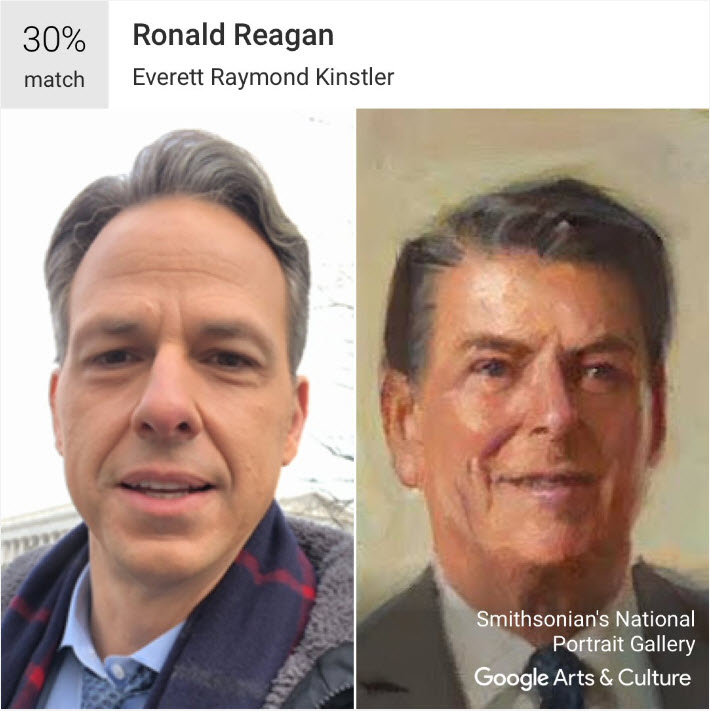Art World
‘It Took Us by Surprise’: Even Google Was Shocked by the Success of Its Megaviral Face-Matching Art App
The search behemoth's app was all the rage on social media this weekend.

The search behemoth's app was all the rage on social media this weekend.

Brian Boucher

Googling yourself took on a whole new meaning this weekend. That’s because a Google app that matches your face with artworks from museums around the globe not only rocketed to the top of your social feed, but also became the number one free app on the iOS app store, according to the company.
“It took us by surprise,” said Patrick Lenihan, a spokesman for Google. “I’m the PR person and I didn’t even pitch anybody.” Google’s Arts and Culture arm added the new selfie feature to its app a month ago, but it wasn’t until the last several days that it took hold. Lenihan didn’t have figures for the “tons and tons” of traffic the app has suddenly seen.
Patient Zero for the viral spike hasn’t been identified, though Lenihan said that recent press coverage from the likes of Gizmodo and Buzzfeed helped launch the app into the stratosphere. The sleuths at Know Your Meme point out that early adopters included celebrities like Fall Out Boy’s Pete Wentz. And a handful of celebrities—from actors Kumail Nanjiani and Kristen Bell to journalists Jake Tapper and Ryan Seacrest—posted their decidedly mixed results to social media:
This google arts and culture app is pretty amazing. Feel real strong about my 40% ? pic.twitter.com/2iyexRkUG5
— pw (@petewentz) January 14, 2018
Hey this one ain’t so bad. pic.twitter.com/er0FxZNVO8
— Kumail Nanjiani (@kumailn) January 13, 2018
In a surprising twist… #GoogleArtsandCulture pic.twitter.com/6bFTQbbSq2
— Ryan Seacrest (@RyanSeacrest) January 16, 2018
Even the New Yorker got in on the action, adding in a dose of political commentary in the process:
Daily Cartoon: Tuesday, January 16th https://t.co/2KSonwylSA
— New Yorker Cartoons (@nyercartoons) January 16, 2018
The genius of the app may lie in its simplicity. Just snap a selfie, and, using face recognition technology, Google will offer several artworks that resemble you, from collections of institutions like the Rijksmuseum in Amsterdam, the Phillips Collection in Washington, DC, or the National Portrait Gallery of Australia. The app even grades itself, telling you a percentage that indicates how closely it was able to match your face to the artwork. (Lenihan says that the tech team couldn’t describe the methodology for the percentage scoring without a lengthy explanation.)
The app was developed by the Google Cultural Institute, a small nonprofit wing of the company based in Paris, whose goal, said Lenihan, is to find cool ways of bringing together technology and culture, especially art. “It’s a platform that allows our thousands of partners, such as museums and nonprofits, to share millions of artworks artifacts with the world.”
Of course, not everyone has welcomed the app with open arms. Some commentators, including actress Alyssa Milano, voiced reservations about handing over their selfies to Google:
I mean, this google app that matches your face to a piece of fine art. Anyone suspicious of just surrendering your facial recognition to google or are we confident they already have that at this point?
4:04 PM – 14 Jan 2018— Alyssa Milano (@Alyssa_Milano) January 15, 2018
The company says there’s no cause for concern. “We don’t use them for anything other than this, and then we get rid of them,” said Lenihan. “We’re not training AI programs in face recognition or anything like that.”
Others have criticized the app’s face matching for people of color, with a writer for Digg even asking, “Is Google’s Arts and Culture App Racist?”
“The team has done a lot of work to make sure that the corpus of works we use is representative along race and gender lines,” Lenihan said.
The app is currently available throughout much of the US; Google doesn’t have a timeline for any wider release at present, Lenihan said.